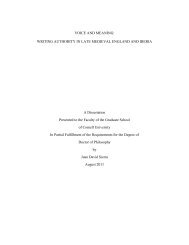Briana Anderson - Cornell University
Briana Anderson - Cornell University
Briana Anderson - Cornell University
Create successful ePaper yourself
Turn your PDF publications into a flip-book with our unique Google optimized e-Paper software.
attractiveness is not an important factor in obtaining positive opinion change or<br />
behavior intention as other factors (such as levels of expertise or supporting<br />
70<br />
arguments), and the findings of this thesis support this research. Taking attractiveness<br />
out of the scale and examining the ratings of endorser trustworthiness and expertise<br />
suggests that attractiveness of endorser had a negative relationship with these factors.<br />
Thus, attractive endorsers might not always be the best bet in public relations<br />
endorsements.<br />
Additionally, from a theoretical standpoint the ‘what is beautiful is good’<br />
(Dion et al., 1972) conception may need to be revisited. It is not suggested that<br />
physically attractive people do not often receive positive attributions based on their<br />
appearance, but that attractiveness does not lead to positive attributions in every<br />
situation. The findings support, however, that people do use attractiveness as a<br />
heuristic in making judgments and attributions about people – attractiveness of the<br />
endorser lead to significantly lower ratings of expertise and trustworthiness.<br />
Third, there is an interaction between attractiveness and company type for<br />
attractive endorsers related to perceived expertise of the source. Though H2 was not<br />
entirely supported, there is support for the fact that, under the conditions of this study,<br />
the company type and attractiveness interaction does exist for perceptions of expertise.<br />
Although unattractive endorsers were rated higher for trustworthiness and expertise<br />
overall, for expertise, attractive endorsers received significantly higher ratings of<br />
expertise for the cosmetics company versus the pharmaceutical company. These<br />
findings suggest a less attractive person may be the best bet for an endorser of a CSR<br />
message for both a pharmaceutical company and a cosmetics company. However, if<br />
a more beautiful endorser is used, she will be perceived as more of an expert for a<br />
cosmetics company than the pharmaceutical. This makes intuitive sense and is also in<br />
agreement with the ‘match-up’ hypothesis, which posits that in advertising and

















